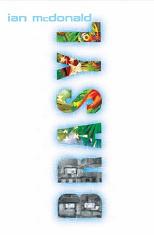
Brasyl
Ian McDonald
404 pages
published in 2007
Call Ian McDonald the anti-Niven. Whereas Larry Niven has often been accused of writing all his characters as if they belong at an early sixties Californian cocktail party, McDonald's characters always come across as belonging to the particular ethnic and cultural background they're said to belong to. This is because McDonald, like the best science fiction writers is genuinely interested in culture as well as science, and genuinely interested in cultures other than his own. He has a knack for painting a picture of a given culture, whether real or invented, through the judicious use of background detail and character interests. So far I've not yet read a McDonald novel in which the world he created didn't convince me. His latest novel, Brasyl, continues that trend. It's set, of course, in that perpetual country of the future: Brazil.
Comparisons with McDonald's 2004 novel River of Gods are therefore quickly made, though unjustified. Apart from that both novels take place in countries that are not often used as a setting in science fiction and apart from these settings being an essential part of them, not just an exotic background for some displaced westerners adventure to take place against, the two novels have nothing much in common. Which is just as well.
Brasyl is divided into three stories. The first takes place now, in 2006 Rio de Janeiro, where Marcelina Hoffman is a tv producer working for what you might call the Brazilian equivalent of Channel Five, trying to come up with the most shocking, disturbing tv shows possible, water cooler television. She thinks she has found the ultimate watercooler show when she comes up with the idea to track down Moacyr Barbosa, the goalkeeper who lost Brazil the Worldcup back in 1950 and who has been in hiding ever since, track him down to let a live tv audience decide whether he should be crucified or forgiven. When she starts working in earnest on this project though, strange things start to happen.
The second storyline takes place in Sao Palo in 2032, where Edson Jesus Oliveira de Freitas is a smalltime hustler from not quite the favelas trying to work his way up, when one of his more stupid brothers manages to steal a top of the line handbag. A handbag protected by a heavily encrypted arfid tag, something that cannot be simply erased and which is putting the rentacops straight on his brother's trail. And though he may not be very bright, it's still his big brother and he wouldn't want him to get killed. Hence Edson makes contact with a quantum hacker shop, people who use highly illegal quantum computers to get around "unhackable" security like the arfid in the handbag. And because he helps out his brother this way, Edson meets and falls in love with Fria, who handles that operation. And then she's killed by what Edson assumes is some parttime vigilante working for the Taking out the Trash tvshow, killed by a knife that can cut through everything, but then he meets her again, or does he?
Meanwhile, in historical times, in 1732, Irish Jesuit priest Luis Quinn (McDonald is contractually obliged to put in at least one Irish character in each of his novels) is sent into the jungle to persuade a rogue brother Jesuit to come back to the church. He's not pleased by his first impressions of the country, where mules, horses and other big mammals all seem to get infected by a plague of madness, and where slaves have taken over from the horses and mules... Yes, this storyline does have some echoes of Heart of Darkness, though they disappear after a while.
McDonald dazzles you with his descriptions of these very different times and worlds, so much so that it takes some time for you to realise that while these three stories are connected, it's not in the obvious way, or that even the parts of the story set in the present, may not be set in our reality. In fact, after a certain point it's clear that Marcilla Hoffman, Edson de Freitas and Luis Quinn certainly don't inhabit the same reality, though you'll probably realise that much earlier than they will.
Yes, Brasyl is a story about alternative realities and reality wars and in some ways that's a bit of a dissappointment. The big revelation at the end of the novel is perhaps not a hoary old cliche yet, but neither is it as fresh or strange as I would've expected from McDonald. He's one of the few science fiction authors who I always expect to come up with something new, something fresh, something startling and this wasn't it.
But if the destination disappointed, the journey was more than worth it. McDonald makes Brazil come alive the way he made India come alive in River of Gods. It's not just that he gets Brazil right, or at least good enough to fool soembody like me who has never been there, it's that he can make the future of Brazil look convincing and Brazilian.
Read more about:
Ian McDonald,
Brasyl,
science fiction,
book review